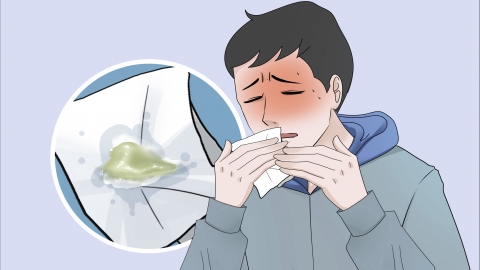Why is there phlegm when I cough, and what should I do?
Generally, coughing with phlegm may be caused by environmental irritation, improper diet, common cold, acute bronchitis, chronic pharyngitis, and other reasons. It is recommended to seek medical attention promptly and receive treatments such as general care and medication under a doctor's guidance. Detailed explanations are as follows:

1. Environmental Irritation
When in a dry, dusty, or irritating gaseous environment, the respiratory mucosa can become irritated. To protect the respiratory tract, goblet cells beneath the mucosa secrete more mucus, forming phlegm that adheres to dust and foreign particles, thus causing coughing with phlegm. It is recommended to wear a mask in poor environmental conditions, use an air humidifier to increase air moisture, and regularly clean living spaces to reduce dust.
2. Improper Diet
Consuming excessive spicy, greasy, or overly sweet foods may irritate the throat and gastrointestinal tract. Through neural reflex mechanisms, this can stimulate the respiratory mucosa to secrete more substances, forming phlegm. It is advisable to maintain a light diet, control the intake of spicy, greasy, and sweet foods, eat more vegetables and fruits, drink plenty of water, and keep the respiratory tract moist.
3. Common Cold
The common cold is usually caused by infections such as rhinovirus or coronavirus. After a viral infection affects the respiratory tract, it may cause congestion and edema of the respiratory mucosa, increased secretion from goblet cells and mucous glands, resulting in phlegm production that irritates the respiratory tract and causes coughing. Symptoms may also include nasal congestion and sore throat. Under a doctor's guidance, medications such as compound paracetamol amine capsules,感冒清热颗粒 (cold-clearing and heat-relieving granules), and oral liquid of Shuanghuanglian can be used for treatment.
4. Acute Bronchitis
Acute bronchitis is often caused by infection, physical and chemical factors, or allergic reactions. Inflammation stimulates the bronchial mucosa, increasing secretion and forming phlegm. Inflammation can also cause bronchial spasms, leading to coughing. Symptoms may include fever and chest pain. Patients may follow medical advice to use medications such as amoxicillin capsules, azithromycin tablets, and levofloxacin hydrochloride tablets to alleviate symptoms.
5. Chronic Pharyngitis
Chronic pharyngitis is mainly caused by repeated episodes of acute pharyngitis, various nasal diseases, chronic respiratory inflammation, long-term mouth breathing, excessive smoking and alcohol consumption, and other long-term irritations to the throat. Chronic congestion of the pharyngeal mucosa and increased secretion from mucous glands can lead to coughing with phlegm, accompanied by symptoms such as throat itching and dry mouth. Patients may follow their doctor's advice to use medications such as domiphen lozenges, cetylpyridinium iodide lozenges, and Yanyan tablets for treatment.
In daily life, attention should be paid to weather changes, timely adjustment of clothing to avoid getting chilled or overheated, and preventing adverse temperature-related irritation to the respiratory system. Additionally, ensure good air circulation by opening windows regularly to maintain fresh indoor air and reduce bacterial and viral growth.




